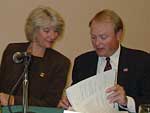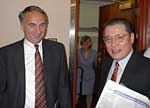Minnesotans say they're hurting from economic shock wave
By Mark Zdechlik
Minnesota Public Radio
October 8, 2001
U.S. Sen. Paul Wellstone chaired a Senate hearing Monday in Bloomington on how the economic slowdown is affecting the state. Wellstone, along with other members of the state's congressional delegation, heard from business and labor leaders, laid-off workers and economists, about what Washington could do to help.
Having approved nearly $60 billion for the airline industry, and to help New York and the Pentagon recover from the terrorist attacks, Congress is now grappling with a broad economic stimulus package. Sen. Paul Wellstone, DFL-Minn., held a hearing of the Senate Health, Education, Labor and Pensions committee in Minnesota to get advice on what ought to be done.
This is, I think for me, perhaps the most serious hearing I've ever had in our state of Minnesota."
Wellstone, DFL Sen. Mark Dayton, DFL Reps. Jim Oberstar, Martin Sabo, and Betty Mccollum, and Republican Rep. Jim Ramstad heard from a wide array of interests. Among them - small business owner George Logan. Days after the September 11th attacks, Logan's construction waste dumpster operation lost one-third of this year's projected revenue, due to cost-cutting by the Metropolitan Airports Commission.
"The president said we should get back to doing things that we normally do. This is hard in my case, since almost one-third of my income has been lost due to the terrorist activity."
Logan told the lawmakers low-interest loans could help small businesses like his weather the bad times.
Jaye Rykunyk, head of the local hotel and restaurant workers union, said nationally about one-third of the 300,000 workers her union represents have lost their jobs. Thousands of them are based here in the Twin Cities.
"Our industry is in free-fall, and our members - who are among the poorest workers in Minnesota - are without a parachute."
Rykunyk testified that many of the people she represents can't find new jobs, and accordingly can no longer meet basic needs.
"While there are numerous mechanisms by which workers can be helped, I cannot stress to you enough the need for a continuation of medical benefits for laid off workers," Rykunyk said.
Minnesota AFL-CIO President Ray Waldron cautioned Congress against focusing on corporate bailouts at the expense of workers.
"Here in Minnesota, a lot of working people and families are hurting and they're looking to you for help and relief. Congress responded well - very well in fact - when the airline corporations called for help, and we supported that. Working families now are calling for help and we're here to ask you to also respond to them," said Waldron.
Most speakers at the hearing agreed that broad-based tax cuts aimed at helping businesses and individuals make the most sense.
Minnesota state economist Tom Stinson urged Congress to inject money into the economy as soon as possible - possibly in the form of a tax rebate. But Stinson warned against long-term tax breaks. He says they could backfire by causing future inflation, since by the time they would be felt, the economy could already be well into recovery. Stinson also said, while it's very early to begin making predictions, he's inclined to think Minnesota will weather the expected recession about as well as the nation as a whole.
While the U.S. Congress has operated with rare unanimity in the weeks since the attacks, ideological differences are re-emerging as lawmakers discuss how to stimulate the economy. Many Republicans favor tax cuts over enhanced assistance for displaced workers.
"I don't know that I want to get into all the specifics of the disagreement right now," said Sen. Wellstone. "I think the most important thing - and I think we agree on this - is that you definitely want to, and need to, help people that are flat on their backs."
Rep. Jim Ramstad was the only Republican member of the state's congressional delegation who took part in the hearing.
"It's no secret that within our House Republican leadership there's a division of opinion, with the speaker agreeing that we should provide relief for laid-off workers, and with our leader Dick Army and our whip Tom Delay being on the other side of that issue. I'm with the speaker," Ramstad said.
The hearing was held at a Bloomington hotel - not at the state Capitol - because of the state workers strike. Sen. Dayton said as Minnesota contemplates its economic future, leaders should place a priority on resolving that dispute in order to get 23,000 striking employees back on the job.
By Mark Zdechlik
Minnesota Public Radio
October 8, 2001
U.S. Sen. Paul Wellstone chaired a Senate hearing Monday in Bloomington on how the economic slowdown is affecting the state. Wellstone, along with other members of the state's congressional delegation, heard from business and labor leaders, laid-off workers and economists, about what Washington could do to help.
| |
|
|
|
||
This is, I think for me, perhaps the most serious hearing I've ever had in our state of Minnesota."
Wellstone, DFL Sen. Mark Dayton, DFL Reps. Jim Oberstar, Martin Sabo, and Betty Mccollum, and Republican Rep. Jim Ramstad heard from a wide array of interests. Among them - small business owner George Logan. Days after the September 11th attacks, Logan's construction waste dumpster operation lost one-third of this year's projected revenue, due to cost-cutting by the Metropolitan Airports Commission.
"The president said we should get back to doing things that we normally do. This is hard in my case, since almost one-third of my income has been lost due to the terrorist activity."
Logan told the lawmakers low-interest loans could help small businesses like his weather the bad times.
Jaye Rykunyk, head of the local hotel and restaurant workers union, said nationally about one-third of the 300,000 workers her union represents have lost their jobs. Thousands of them are based here in the Twin Cities.
"Our industry is in free-fall, and our members - who are among the poorest workers in Minnesota - are without a parachute."
Rykunyk testified that many of the people she represents can't find new jobs, and accordingly can no longer meet basic needs.
| |
|
|
|
||
Minnesota AFL-CIO President Ray Waldron cautioned Congress against focusing on corporate bailouts at the expense of workers.
"Here in Minnesota, a lot of working people and families are hurting and they're looking to you for help and relief. Congress responded well - very well in fact - when the airline corporations called for help, and we supported that. Working families now are calling for help and we're here to ask you to also respond to them," said Waldron.
Most speakers at the hearing agreed that broad-based tax cuts aimed at helping businesses and individuals make the most sense.
Minnesota state economist Tom Stinson urged Congress to inject money into the economy as soon as possible - possibly in the form of a tax rebate. But Stinson warned against long-term tax breaks. He says they could backfire by causing future inflation, since by the time they would be felt, the economy could already be well into recovery. Stinson also said, while it's very early to begin making predictions, he's inclined to think Minnesota will weather the expected recession about as well as the nation as a whole.
While the U.S. Congress has operated with rare unanimity in the weeks since the attacks, ideological differences are re-emerging as lawmakers discuss how to stimulate the economy. Many Republicans favor tax cuts over enhanced assistance for displaced workers.
"I don't know that I want to get into all the specifics of the disagreement right now," said Sen. Wellstone. "I think the most important thing - and I think we agree on this - is that you definitely want to, and need to, help people that are flat on their backs."
Rep. Jim Ramstad was the only Republican member of the state's congressional delegation who took part in the hearing.
"It's no secret that within our House Republican leadership there's a division of opinion, with the speaker agreeing that we should provide relief for laid-off workers, and with our leader Dick Army and our whip Tom Delay being on the other side of that issue. I'm with the speaker," Ramstad said.
The hearing was held at a Bloomington hotel - not at the state Capitol - because of the state workers strike. Sen. Dayton said as Minnesota contemplates its economic future, leaders should place a priority on resolving that dispute in order to get 23,000 striking employees back on the job.


